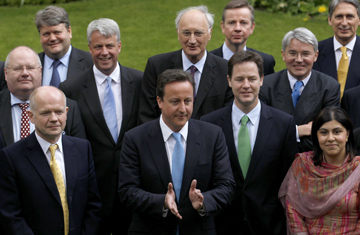
Britain's Prime Minister David Cameron (front row, second from left) with his new Cabinet ministers
(2 of 2)
The Economy and the Deficit
With Britain crawling out of recession, showing just 0.2% growth in the first quarter of the year, and with a $245 billion deficit hanging over the country, the economy is the big one. Cameron's Tories, under new Chancellor George Osborne, have long been calling for an immediate $8 billion cut in spending, which both the Lib Dems and the defeated Labour government claimed would do immense damage to public services and could pitch the U.K. into a double-dip recession.
However, with an emergency budget planned within the new government's first 50 days, the Tories will get their wish. As an example to the country, Cameron announced that all his ministers will have a 5% pay cut, reducing their annual salaries to about $195,800. Only Britons' much cherished National Health Service and the international-aid budget have been protected from the expected 15% cuts across all government departments, with a specific pledge that health spending will rise above inflation.
Immigration
Immigration has long been the issue that dared not speak its name for fear of raising cries of racism or xenophobia. But the widening of border-free Europe to 27 states, including former Eastern European nations, has given millions of citizens the right to work anywhere in the E.U. and has put the issue near the top of the political agenda.
The Liberal Democrats have conceded defeat here, abandoning their policy of an amnesty — which they called "earned citizenship" — for the unknown number of illegal immigrants currently in the U.K., and accepting Conservative plans for an as yet unspecified annual cap on the number of immigrants allowed into the country each year.
Defense
Britain's U.S.-made Trident submarine-based nuclear-missile system has long been a source of debate over its desirability in a world looking to reduce nuclear weapons, its usefulness in a post–Cold War era and its claimed independence from U.S. permission to launch.
The previous Labour government planned to replace the current system as it reaches the end of its shelf life in the mid-2020s. The Conservatives agreed, but the Lib Dems, supported by some former defense chiefs, demanded a full review of alternatives, claiming that a decision to replace need not be made now. The Conservatives got their way on this one, but this remains an issue of high controversy that can be expected to return one day to trouble the new coalition government.
